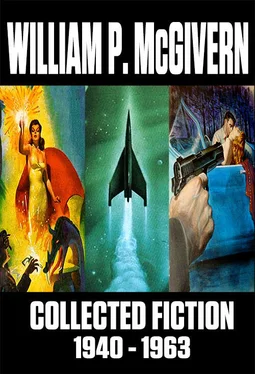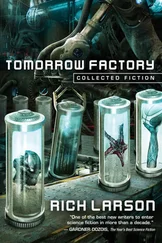Уильям Макгиверн - Collected Fiction - 1940-1963
Здесь есть возможность читать онлайн «Уильям Макгиверн - Collected Fiction - 1940-1963» весь текст электронной книги совершенно бесплатно (целиком полную версию без сокращений). В некоторых случаях можно слушать аудио, скачать через торрент в формате fb2 и присутствует краткое содержание. Год выпуска: 2014, Издательство: Jerry eBooks, Жанр: Ужасы и Мистика, Фантастика и фэнтези, Детектив, Прочие приключения, на английском языке. Описание произведения, (предисловие) а так же отзывы посетителей доступны на портале библиотеки ЛибКат.
- Название:Collected Fiction: 1940-1963
- Автор:
- Издательство:Jerry eBooks
- Жанр:
- Год:2014
- ISBN:нет данных
- Рейтинг книги:3 / 5. Голосов: 1
-
Избранное:Добавить в избранное
- Отзывы:
-
Ваша оценка:
- 60
- 1
- 2
- 3
- 4
- 5
Collected Fiction: 1940-1963: краткое содержание, описание и аннотация
Предлагаем к чтению аннотацию, описание, краткое содержание или предисловие (зависит от того, что написал сам автор книги «Collected Fiction: 1940-1963»). Если вы не нашли необходимую информацию о книге — напишите в комментариях, мы постараемся отыскать её.
Collected Fiction: 1940-1963 — читать онлайн бесплатно полную книгу (весь текст) целиком
Ниже представлен текст книги, разбитый по страницам. Система сохранения места последней прочитанной страницы, позволяет с удобством читать онлайн бесплатно книгу «Collected Fiction: 1940-1963», без необходимости каждый раз заново искать на чём Вы остановились. Поставьте закладку, и сможете в любой момент перейти на страницу, на которой закончили чтение.
Интервал:
Закладка:
Royce frowned at the map, considering the traffic and weather conditions in the killer’s area. He didn’t like Tonelli’s idea; blocking a car at high speed was never an easy mission, but tonight it would be especially hazardous. He trusted his men and had a fierce pride in their skill and judgment, but he didn’t intend to expose them to the caprices of a madman under these circumstances. Also, there were the civilian motorists to consider; if there was shooting or if the killer attempted to evade the patrols, it could cause a panic that might result in a bloody wreck.
“We’ll let him get off the pike,” Royce said, “He’s got just three more chances, at Exits Three, Two and One. We’ll take him when there’s no chance of involving anybody else.”
“And what about the girl?”
Royce turned from the map and stared at the windows; outside the weather had worsened, and the rain rolled in waves down the wide panes. He could see the flash of the turnpike traffic moving sluggishly through the storm.
“We’ll try to keep him so busy he won’t have time to worry about her,” he said slowly. “It’s all we can do. And it isn’t much. Right now he’s dangerous. He lost the convoy, and if he’s not a complete madman he’ll know he can’t catch it. His plans have gone wrong, and he’ll be expecting trouble.” He rubbed his forehead. “If we could just calm him down a bit, make him feel confident. Then we could...” Royce paused, still staring at the windows. A grim smile touched his hard, seasoned features. “He’s looking for a convoy, isn’t he, sergeant? Supposing we arrange one for him?”
“What do you mean?”
“Listen, then get hustling. Flash Interchange Two, and Sergeant Brannon at Substation South. We’re going to put a convoy on the pike ahead of the killer. Our convoy. With escort patrols at the front and rear. We’ll let him into it. Then we’ll spring the trap.”
XVIII
The eight black sedans were commandeered from the municipal administrations of townships at the southern end of the pike. They were assembled in convoy column fifteen minutes after Royce’s order was transmitted to Sergeant Brannon, and at one minute after ten o’clock they rolled smoothly through Interchange 2 and merged with the southbound traffic on the pike. The convoy moved into the right-hand lane, with the escorting patrols clearing a path with their sirens. Al the head of the column was Trooper Frank Sulkowski, a seasoned veteran who kept the convoy speed down to fifty miles an hour. At the rear was Dan O’Leary. He was watching his rear-vision mirror for any glimpse of the killer’s Ford. The eight sedans herded between them were manned by troopers and detectives in civilian clothes, and the drivers were purposely allowing an inviting interval between each car. The convoy was a moving trap, with seven holes baited to tempt the killer.
O’Leary lifted his receiver and spoke to Sulkowski. “I think we’re too fast, Frank. Let’s drop it a bit.”
“Check.”
Their exchange was monitored by the dispatcher at headquarters, who relayed it to Captain Royce. “Convoy’s in lane three, milepost eighteen. Reducing speed below fifty.”
Royce nodded and checked the position of the killer’s car on the map. Standing beside him was Major Townsend, the state-police commandant’s chief of staff. He had arrived a few minutes before, a wiry man in his late fifties, for a personal report from Royce on the situation.
“Milepost eighteen,” Townsend said. “And where’s the Ford?”
“A quarter of a mile behind. We’ve got it under surveillance. He’s coming up steadily.”
“And if he bites? What then?”
“The convoy will close up its intervals and swing over onto the middle lane. Unmarked cars in lanes one and three will come up on each side of him. He’ll be in a four-car box.”
“And supposing he doesn’t bite? Is there anything about the look of our convoy that might make him suspicious?”
“I don’t think so, major. Not unless he’s a mind reader. There’s nothing about our convoy to distinguish it from the President’s. Particularly on a dark, rainy night like this one. Its rate of speed is consistent, and it’s moving along right where the killer will expect it to be — in the right-hand lane, same number and type of cars as the President’s, with patrols at the front and rear, beacon lights flashing.”
“All right,” the major said. “Assume he sticks his head into the noose. Where do you intend to take him into custody?” Royce moved closer to the map and pointed to Exit 1, the last interchange on the pike. “Right here, sir.”
XIX
O’Leary didn’t identify the Ford until pulled up alongside him in the middle lane; until that instant it had been nothing but a blur of approaching brightness in his rear-vision mirror. Now he saw the driver’s bulky silhouette and, as the sedan crept past him, the license number. He picked up his receiver and spoke to Sulkowski. “He’s just passing me. Frank.”
Other voices cracked from O’Leary’s radio phone — the dispatcher at headquarters, and then the troopers in the unmarked cars tailing the Ford.
O’Leary watched the killer’s car pull slowly abreast of the convoy, red tail-lights winking in the rainy darkness. Then the car picked up speed suddenly and swerved right, taillights disappearing abruptly. The killer had slipped in between the third and fourth sedans in the convoy.
O’Leary said sharply, “He’s in, Frank!”
“Check!” Sulkowski said. “Close up the intervals now and hang on.”
The drivers of the third and fourth sedans in the convoy skillfully shortened the intervals between themselves and the Ford, and then the column of cars curved gracefully as Sulkowski swung into the middle lane. Unmarked patrols came-up swiftly in lanes one and three to position themselves alongside the killer’s car. The carefully timed mission was complete; the killer was boxed in on all sides, caught in a moving trap that rushed him along toward the last exit on the pike.
Captain Royce’s plans to capture the killer were based on the fundamentals of simplicity and surprise; the police convoy would be escorted to the tollgate at the extreme right side of the interchange and kept well dear of normal turnpike traffic. The highway beyond the exit stretched a half mile to the Washington Bay Bridge, and this area was blocked off; all other traffic was being diverted to secondary roads.
At headquarters Royce explained the final details to Major Townsend. “We’ll stop the convoy right here,” he said, turning to the map and pointing to the right-hand toll booth at Exit 1. “About fifty yards this side of the toll booth we’ve placed a traffic standard or red blinker lights. When the convoy stops, a trooper will salute the first car and point to these lights, indicating that he wants the driver to stay on the right of them. Then he’ll salute again and wave the car on past the toll station. He’ll repeat this performance at the next two cars. The killer’s car comes next. The killer will be watching, naturally, but all he’ll see is a respectful trooper waving the President’s convoy into its proper lane, expediting its departure from the pike.” Royce prodded the surface of the map with his finger. “Meanwhile, troopers will be coming up behind the killer with their guns drawn. Dan O’Leary, who’s the tail escort on the convoy, will leave his car and move up on the right. Troopers and detectives from the convoy cars will join him, covering the killer on both sides. They’ll take him from behind, and they’ll kill him if he makes a fight of it.” Royce glanced at Major Townsend. “See any bugs in it?”
“No, it looks all right. I don’t like exposing the trooper in front of the killer. And I don’t like the fact that the girl’s probably in the car. But if things were as simple as I’d like them to be, we could go fishing and let a pack of Girl Scouts make the arrest.”
Читать дальшеИнтервал:
Закладка:
Похожие книги на «Collected Fiction: 1940-1963»
Представляем Вашему вниманию похожие книги на «Collected Fiction: 1940-1963» списком для выбора. Мы отобрали схожую по названию и смыслу литературу в надежде предоставить читателям больше вариантов отыскать новые, интересные, ещё непрочитанные произведения.
Обсуждение, отзывы о книге «Collected Fiction: 1940-1963» и просто собственные мнения читателей. Оставьте ваши комментарии, напишите, что Вы думаете о произведении, его смысле или главных героях. Укажите что конкретно понравилось, а что нет, и почему Вы так считаете.

![Уильям Макгиверн - Завтра опять неизвестность [английский и русский параллельные тексты]](/books/35168/uilyam-makgivern-zavtra-opyat-neizvestnost-angli-thumb.webp)









